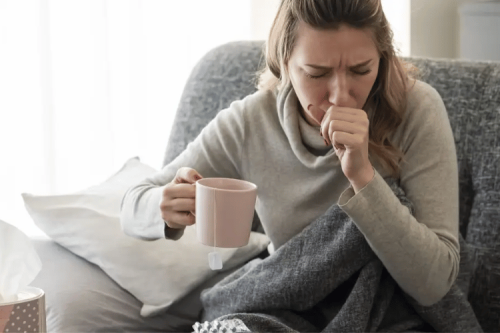
Choking on water is an unexpected and unpleasant experience that can leave you gasping for breath and struggling with a persistent cough. While generally harmless, choking can sometimes cause discomfort, prolonged coughing fits, or even rare complications like aspiration pneumonia if not appropriately managed. Understanding why this happens, what to do immediately, and how to prevent it in the future can be incredibly useful.
This guide provides an in-depth look at the causes of choking on water, actionable advice to stop coughing, crucial first aid techniques, and precautions for prevention. By the end of this article, you'll know how to respond effectively and ensure your airway health remains intact.
Why Do We Cough After Choking on Water?
Coughing is the body's natural defense mechanism to clear the airway when something goes astray. Understanding why and how this happens can help you respond better the next time.
What Happens When You Choke on Water?
When you drink water, it is supposed to travel down the esophagus to enter your stomach. However, sometimes, water may mistakenly flow into the trachea (windpipe) instead of the esophagus. This misdirection occurs when the epiglottis, a flap of cartilage at the base of the tongue, fails to close correctly.
The trachea is part of your respiratory system, and any foreign material here can interfere with your ability to breathe. The body immediately triggers the cough reflex, which forcefully expels the water to prevent it from reaching the lungs.
Factors That Make Choking on Water More Likely
- Distractions while drinking (e.g., talking, laughing, or multitasking).
- Swallowing too quickly or gulping down large amounts of water.
- Underlying conditions like dysphagia (swallowing difficulty), asthma, or gastroesophageal reflux disease (GERD), which may interfere with normal swallowing.
- Drinking while lying down or in an awkward posture that misaligns the airway.
The Cough Reflex Explained
The cough reflex serves as an essential safeguard for the lungs. When water or any foreign object enters the trachea, sensors in the throat and airway trigger the brain to initiate a series of rapid muscle contractions. These contractions create forceful air bursts, aiming to dislodge the offending material.
While effective, this reflex can also leave behind residual irritation and occasional spasms, prolonging the coughing even after the water has been expelled.
Immediate Steps to Stop Coughing
If you’re coughing after choking on water, here are effective strategies for calming your throat and regaining comfort.
1. Stay Calm
Panicking worsens the situation by tightening throat muscles, intensifying spasms, and making breathing harder. Instead, focus on regulating your breathing.
2. Breathe Through Your Nose
Take slow and controlled breaths through your nose. This technique reduces throat dryness and prevents hyperventilation, calming the coughing reflex.
3. Take Small Sips of Water
Counterintuitively, sipping water can help soothe your throat. Take slow, controlled sips to hydrate and ease the irritation. Avoid gulping, as it might worsen the situation.
4. Lean Forward While Coughing
Position your body by bending slightly forward at the waist to help safely expel any lingering water from your airway.
5. Use Honey or Warm Liquids
- Honey coats the throat and eases irritation. Take a teaspoon of honey directly or mix it into warm water or tea.
- Warm, non-caffeinated beverages (like chamomile tea or broth) relax throat muscles and reduce spasms; however, avoid hot liquids as they can intensify irritation.
6. Reset Your Breathing Reflex
Hold your breath for 3–5 seconds, then exhale slowly. This technique can sometimes interrupt and reset the coughing cycle.

Immediate Steps to Stop Coughing
First Aid for Severe Choking on Water
Although choking on water is typically not life-threatening, some situations may require first aid intervention, especially if the airway is significantly obstructed.
What to Do if Someone Is Choking on Water?
-
Encourage Coughing
- Allow the person to continue coughing vigorously since this is the body’s most efficient airway clearing.
-
Administer Back Blows
- If they cannot breathe or cough effectively, stand behind them and lean them slightly forward. Using the heel of your hand, deliver 5 firm back blows between their shoulder blades.
-
Perform Abdominal Thrusts (Heimlich Maneuver)
- Stand behind the person, wrap your arms around their waist, and place one fist above their navel. Grasp the fist with your other hand and deliver quick, upward thrusts to dislodge the water.
-
Call for Emergency Help
- If these methods fail or the person becomes unresponsive, call emergency services immediately and begin CPR if trained.
How to Prevent Choking on Water?
Prevention is key to avoiding future incidents and ensuring safe drinking habits for you and those around you.
1. Practice Safe Drinking Techniques
- Take small sips instead of large gulps.
- Avoid drinking while lying down or in a reclined position.
- Avoid distractions (talking, laughing, or multitasking) while drinking.
2. Pay Special Attention to High-Risk Groups
- Children are more prone to choking due to underdeveloped swallowing reflexes. Always supervise them during meals or drinks.
- Elderly individuals, especially those with swallowing difficulties, should drink slowly and use adaptive utensils if necessary to prevent choking.
3. Address Underlying Medical Conditions
- Consult a healthcare professional if you have persistent swallowing difficulties or other conditions that increase your choking risk. Speech therapy and swallowing exercises can offer significant improvements.

How to Prevent Choking on Water
Understanding Aspiration Pneumonia
What Is Aspiration Pneumonia?
Aspiration pneumonia occurs when water, food, or other substances accidentally enter the lungs instead of the stomach. This can lead to infections, as the lungs are not equipped to process foreign material.
Symptoms of Aspiration Pneumonia
- Persistent coughing or wheezing.
- Shortness of breath.
- Chest pain during breathing.
- Fatigue or fever that develops hours or days after choking.
If these symptoms occur, seek medical attention promptly for diagnosis and treatment. Early intervention can prevent complications.
Frequently Asked Questions
Q: What should I do if someone is choking on water?
A: If someone is choking on water, encourage them to continue coughing forcefully to expel the liquid. If they cannot breathe or their cough is ineffective, perform first aid for choking by applying back blows or abdominal thrusts to help dislodge the water from their airway.
Q: Can a chronic cough occur after choking on water?
A: A chronic cough may develop due to lung or airway irritation after water aspiration. If coughing persists, it is advisable to seek medical attention to rule out any underlying issues.
Q: What are the techniques for choking on water?
A: Techniques for choking on water include encouraging the person to cough forcefully to clear the water, performing back blows, and abdominal thrusts if they are in severe distress. These methods help expel the liquid from the airway.
Q: How can I help someone struggling to breathe after choking on water?
A: If a person struggles to breathe after choking on water, it is crucial to act quickly. Encourage them to continue coughing, and if they cannot breathe, perform first aid for choking immediately to help expel the liquid from their airway.
Q: What is water aspiration, and how does it relate to choking?
A: Water aspiration occurs when liquid enters the airway, potentially leading to choking. This can happen when a person swallows water incorrectly, leading to coughing or difficulty breathing as the body attempts to expel the liquid.
Q: Are certain age groups more at risk of choking on water?
A: Different age groups have varying risks of choking on water. Young children and the elderly are often more vulnerable due to developmental stages and potential medical conditions that make choking more likely.
Q: What should I do if water enters my airway while drinking?
A: If water enters your airway while drinking, you should cough forcefully to expel the liquid. If you cannot stop coughing or are struggling to breathe, seek assistance immediately to help clear the water from your airway.
Q: How can I help prevent choking on water?
A: To help prevent choking on water, take small sips, avoid talking or laughing while drinking, and ensure you are in a safe environment. It is also essential to be aware of any medical conditions that may increase the risk of choking.
Q: Can someone die from choking on water?
A: Yes, choking on water can lead to severe distress and, in extreme cases, can be life-threatening if the airway is blocked for an extended period. Immediate action is necessary to help clear the airway and prevent fatal outcomes.
Q: What is the treatment for chronic cough related to choking incidents?
A: Treatment for a chronic cough that arises from choking incidents may include medications to help control the cough and therapies to address any underlying conditions. It is recommended that you consult a healthcare professional for a proper diagnosis and treatment plan.
The Bottom Line
Choking on water is surprisingly common but typically harmless. However, the coughing and discomfort that follow can be distressing. By understanding the causes and knowing proper techniques to manage choking, you can ensure quicker recovery and prevent potential risks like aspiration pneumonia.
For high-risk groups such as children and the elderly, fostering safe drinking habits and staying alert can be life-changing. Whether you’re dealing with a minor episode or a severe case of choking, having the right knowledge and tools at hand can make all the difference. Stay informed, stay safe, and breathe easy!








 Login with Google
Login with Google Login with Facebook
Login with Facebook